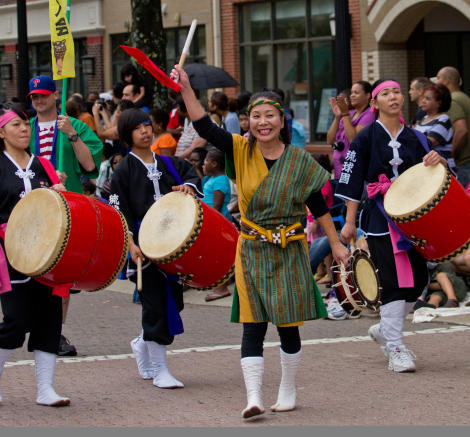
Local tourism industry relies on hotel tax
By Jenna Shackelford, posted Jun 1, 2021 on BizFayetteville.com

Local tourism events rely on hotel taxes to provide for events and local destinations.
Any person who has lived or stayed in a hotel, AirBnB, or apartment community for a short-term stay under three months in Cumberland County has been charged a six percent occupancy tax. The county and city tax rate, which cannot exceed six percent each, is imposed by the North Carolina Travel and Occupancy Commission.
How is that money used?
While these taxes are imposed statewide, in a transient community such as Cumberland County, the impact of the revenue generated is relied upon by the Tourism Development Authority to bring new people into the community, which in turn, brings new revenue to the area.
“A visitor who stays at an area hotel is much more than a head in a bed,” said Angie Brady, director of tourism and client relations of the Fayetteville Area Convention & Visitors Bureau. “In addition to paying occupancy tax, which is distributed to local organizations via the Tourism Development Authority, visitors spend money at our lodging, attractions, restaurants, retail and other area locations. All state and local taxes collected from visitor spending benefit Cumberland County’s economy.”
Occupancy taxes are written differently across the state for each county. One commonality between the different requirements is that each tax dollar should be used for marketing of the community to increase overnight visitation.

Hotel taxes collected locally are used to pay for tourism events and local tourism marketing.
In Cumberland County, half of three percent of the six percent tax goes to the Crown Coliseum, and half of three percent goes to the Arts Council of Fayetteville/Cumberland County. The remaining three percent goes to the Tourism Development Authority.
Ninety percent of the money that goes to the TDA goes to the FACVB for marketing and tourism. The TDA keeps the remainder for funding different grant requests that target marketing and tourism.
Whatever is left is essentially used for grants and other means of bringing people from the outside of Cumberland county to visit. Some of these events include the Cumberland County Fair, the International Folk Festival, the Holly Day Fair, the Indigo Moon Film Festival and the Dogwood Festival, to name a few.
In 2019, prior to the COVID-19 pandemic, domestic travel expenditures in Cumberland County totaled $601.12 million. State and local taxes collected from visitors totaled $44.59 million. This translates into a $134.14 tax savings per county resident, according to a study prepared for Visit North Carolina by the U.S. Travel Association called, “The Economic Impact of Travel on North Carolina Counties.”
“The FACVB strives to provide a positive visitor experience, which leads to longer stays and ultimately, more expenditures,” Brady said.
The Tourism Development Authority was created by the North Carolina state statute regarding occupancy tax. It is a governing board over the occupancy tax usage. Each Tourism Development Authority is different across the state. Each county has different regulations on how that money would be appropriated out.
In Cumberland County, two of the slots on the board are people in the hotel industry that have 100 units or more. Two of the people are in the hotel industry and have 100 units or less. One is a public figure not related to tourism that can apply for the position. There is also a county manager as a voting member, and the Chamber of Commerce has a position as well.
In Cumberland County, there are 72 properties that contribute to the occupancy tax. Two assets of the community are the existence of both a major interstate and a military base.
In mid-May, FACVB published a detailed visitor profile for fiscal year 2021. The report showcased data from July 1, 2020 to May 11, 2021 and will continuously be updated. According to the document, 42% of visitors came to the area to vacation, 11% came to visit friends and family, 15% were relocating; eight percent were travelling through the area; and four percent were travelling to see a specific attraction. The remainder of the visitors were here for conventions, events or festivals, business, or other reasons.
With less events and festivals due to the pandemic, those numbers are not as hearty as they could be. But Vivek Tandon, current chair of the TDA, hopes to see improvement, although they are moving forward with an abundance of caution.
More requests for grants are coming in this year than last year, and the TDA continues to monitor COVID infection rates and state regulations.
Tandon sees the value in how each recipient of the tax works to bring in visitors. “I don’t think anybody understands what the CVB does, but they have been the only leg until recently doing solely marketing and promotion of tourism in Cumberland County. They’re the only leg that goes after group business and big events and sporting events that try to supply hotel rooms to the hotels by bringing big groups in, whether they’re religious, sports, larger festivals … and that’s where the TDA has helped a lot.
“We’ve supported many festivals over the years and artistic events … We’re trying to see cultural tourism grow.”
Some events do not get any support unless they have sponsorships, so the grants oftentimes are a driving source behind many community gatherings.
The TDA also supports the marketing efforts of the Fayetteville Cumberland Economic Development Corporation.
“We like to see (places) grow,” Tandon said. “We like to compete with Raleigh, and Charlotte and Greensboro and Wilmington… We’ve been an advocate to see the progression of Fayetteville and Cumberland County’s growth.”
Copyright © 2026
Enhanced Media Management Inc. dba
Greater Fayetteville Business Journal
This story may be displayed, reformatted and printed for your personal, noncommercial use only and in
accordance with our Terms of Service located at https://bizfayetteville.com/useragreement.